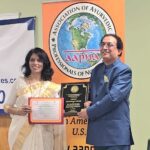Lack of organ donors restricting kidney transplants to less than 10K in India
India
healthysoch
New Delhi,March 04, 2021:


ASSOCHAM organized this webinar with an objective to cascade mass awareness and disseminate knowledge & wisdom for prevention and treatment of kidney related disorders.
The virtual event was graced by a team of eminent nephrologists and urologists who shared their valuable inputs on causes, trends and recent advancements in the treatment of kidney related ailments, which included – Dr Sanjiv Saxena, chairman, Nephrology & Kidney Transplant, Department of Nephrology, PSRI Hospital; Dr (Prof) Dinesh Khullar, chairman & Head of Department of Nephrology & Renal Transplant Medicine, Max Super Specialty Hospital, Saket and Dr Rajesh Kesari, founder and director, Total Care Control who served as a moderator for the panel.
The ASSOCHAM’s campaign running under a CSR initiative supported by SAVLON, aims at promoting healthy living with a keen focus on wellness and preventive health through healthy habits, diet, exercise, and holistic health.
Noting that organ transplantation can help save thousands of lives across India, Dr Khullar while addressing the ASSOCHAM webinar suggested that up to 30,000 kidney transplants may succeed in India if significant awareness and promotion is undertaken by concerned authorities in this regard.
In India, over 2 lakh kidney patients are added every year and more than 90 per cent kidney donors are either family members or close relatives, while only 8-10 per cent such kidney donations are received from brain dead persons.
“If we can promote organ donations on a large scale, at least up to 30,000 kidney transplants may succeed in place of a meagre 8,000 currently,” said Dr Khullar.
Kidney disease is a progressive disease. However, the progression rate of kidney disease may be lesser with proper and timely cure. Anybody who is between 21 and 70 years and healthy (except persons with diabetes, severe blood pressure, heart disease, protein leak from Urine and other sever disease) can become the kidney donor.
“In India, the organ donors are not in sufficient numbers to save lives, we should promote organ donation so that many lives could be saved,” he said further.
In developed countries, 90 per cent organ donations come from accidents whereby patients become brain dead and that can help save 6-7 persons’ lives through donation of kidneys, lungs, heart, pancreas, liver, intestine and other organs.
Dr Saxena while sharing his views highlighted that while most of the over-the-counter (OTC) drugs i.e. medicines sold directly to a consumer without a requirement for a prescription from a healthcare professional are safe. He also said that “continuous intake of OTC products like painkillers, and antibiotic drugs without any consultation of medical practitioner may adversely affect kidney. We should avoid unnecessary usage of antibiotics medicines without any medical consultation.”
Adding to this point, Dr Khullar said that while Government has allowed only few medicines as OTC products, however sometimes chemists prescribe medicines on their own and such practices should be strictly disallowed.
The session was moderated by Dr Rajesh Kesari, founder and director, Total Care Control who also shed some light on the gravitas of the topic and highlighted the need to stay healthy and eat right, as he successfully summarized the discussion with expert inputs of the esteemed panel.
healthysoch







